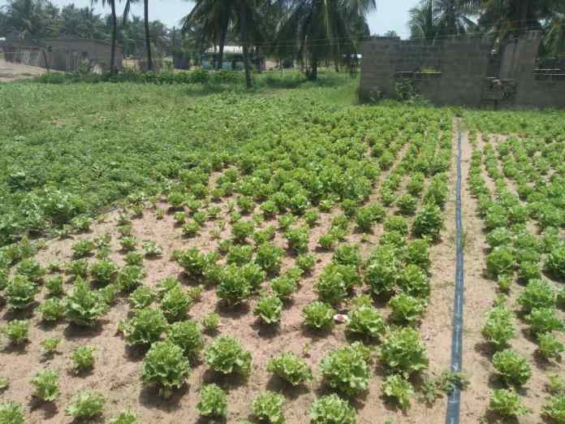Engineers at the Kwame Nkrumah University of Science and Technology (KNUST) are warning against consumption of vegetables grown along the Bibini River in Kumasi.
This is due to the detection of unsafe levels of heavy metals such as lead and cadmium and harmful bacteria.
The Bibini river is found within KNUST and is a tributary of Wiwi river.
It serves as a source of irrigation water for vegetables especially lettuce grown around the area.
Restaurants and food vendors in Kumasi and Accra purchase vegetables from farms along the Bibini river.
However, the river receives waste materials from a drain that has its content coming from a petroleum filling station, a car washing bay, gymnasium, hair salons, and greywater drains from adjoining hostels as well as drains from some KNUST engineering laboratories.
These activities result in the introduction of heavy metals and bacteria.
With time, these waste materials accumulate in agricultural soils and into food crops thus causing health problems.
The study therefore sought to find out the quality of the Bibini river used for irrigation and its impact on vegetable quality cultivated along the river.
The study published in the Journal of Environment & Ecosystem Science (EES) found the water from the river to be of low quality.
“The water quality indicators; dissolved oxygen, biochemical oxygen demand and water temperature were not within the recommended standards of Ghana’s Environmental Protection Agency,” lead investigator, Dr. Bennetta Koomson of the Department of Materials Engineering explained.
The research team also found that heavy metals including Cadmium, Lead and Chromium were present in the water, soil and vegetables.
Cadmium and lead found in vegetables were above the permissible limits.
Harmful bacteria were also found in the irrigation water as well as the lettuce.
“This makes them unsafe for human consumption as they can have adverse health implications on consumers.
“Microbial populations of faecal coliforms were found in the irrigation water as well as on vegetables produced beyond required levels indicating the vegetables produced are contaminated and of low quality hence can affect human life when consumed,” she said.
The team wants farmers to relocate to other areas to avert any future unfortunate events. “Farmers must be extensively educated and encouraged to relocate to other suitable farming land,” she advised.
Latest Stories
-
I’m not a violent person – Hawa Koomson speaks after Ablekuma North rerun chaos
1 minute -
‘It won’t deter me’ – Hawa Koomson vows to stay in politics despite assault
17 minutes -
Energy Minister blames ‘greedy individuals’ for undermining ‘otherwise good’ PDS deal
26 minutes -
I didn’t go to Ablekuma North polling station with ill motive – Hawa Koomson
37 minutes -
Global Summit Series Africa 2025 unveils bold speaker lineup to drive ‘Africa on Purpose’
1 hour -
Remote communities to benefit from $85m solar energy rollout – Jinapor
1 hour -
2-month-old baby dies in fire incident at Madina
1 hour -
Tinny returns with new Afropop song ‘Barrier’
1 hour -
NSMQ 2025: T.I. AMASS Salaga knocks out regional favorites Damongo SHS to secure first national championship spot
1 hour -
Invest with confidence: MiDA CEO champions ’24-Hour Economy’ as bankable and transparent
1 hour -
Korea Week 2025: A celebration of culture, connection, and rise of fierce crew GH
1 hour -
African Corporate Governance Network appoints first female CEO in its 12-year history
1 hour -
Is Ghana’s tech sector growing well?
1 hour -
Ghana to host first genocide memorial monument in Accra
2 hours -
Ghana unveils ambitious renewable energy drive to boost green transition and economic growth
2 hours

